Queen’s University Belfast admissions are offered in 448 undergraduate programs and 178 postgraduate taught courses. The university enrolls over 24,000 students from 90 countries, including 1,027 students from India. The university follows UCAS deadline of January 29, 2026 for undergraduate applications. Students can still submit applications until June 30, 2026 to be considered on space availability basis. The UCAS application fee is £28.50 (~INR 3,197) for undergraduate admissions. All the masters programs at Queen’s University Belfast begin in September with variable application deadlines and no application fee. The university keeps its acceptance rate confidential, however, according to reports, Queen’s University Belfast acceptance rate is only 35%.
Admission requirements for undergraduate programs at Queen’s University Belfast include Standard XII (CBSE/CISCE/State Boards) scores ranging from 70-85%. Medicine and Dentistry applicants require a minimum of 90% in Chemistry and Biology. Postgraduate applicants need a First Division degree (58-60%) for UK 2:1 equivalent and a Second Division degree (53-55%) for UK 2:2 equivalent. The university requires an IELTS score of 6.5 (no band below 5.5) or 70% in Standard XII English (CBSE/CISCE or select State Boards), or equivalent as a mandatory proof of English proficiency. Postgraduate admission decisions of Queen’s University Belfast are made within 2 weeks. Undergraduate decisions for most applicants are expected to be provided by 16 May 2026.
Queen's University Belfast Admission Deadlines
Queen's University Belfast follows UCAS guidelines for admission to the undergraduate programs. The equal consideration deadline was on 29 January 2025. However, you can still apply until 30 June 2025, to be accepted by the university on space-availability basis.
The application deadlines for postgraduate programs at Queen's University Belfast are course-specific. Here are the deadlines for some popular postgraduate programs:
Queen's University Belfast Postgraduate Admissions
Indian students can pursue 178 postgraduate programs at Queen's University Belfast. The university also offers 72 postgraduate research programs. Indian students require the following for admission to the postgraduate courses in the university:
| UK Degree | Equivalent Indian Bachelor’s Degree Requirement | CGPA Equivalent (10-Point Scale) |
|---|---|---|
| Upper Second-Class Honours (2:1) | First Division with 58-60% or higher | 5.8 - 7.5, depending on institution and grading system |
| Lower Second-Class Honours (2:2) | Second Division with 53-55% or higher | 5.3 - 6.5, depending on institution and grading system |
Supporting Documents:
- Official transcripts and certificates of any essential qualifications
- Personal details
- Referee details
- A personal statement (if applicable to your selected course)
- Grading scale
- Official Digilocker verification
CGPA is assessed based on each institution's grading system, and applications are reviewed individually. Candidates from top Indian universities with strong Second-Class degrees (58%+ for 2:1, 53%+ for 2:2) may be considered at the discretion of the selectors. Factors such as performance in relevant modules and the number of attempts taken to achieve the final grade are also considered.
Also Check: How to Convert CGPA to Percentage?
Postgraduate English Proficiency Requirements
Indian students require one of the following minimum scores to prove English proficiency:
| Qualification | Minimum Requirement | Validity |
|---|---|---|
| Standard XII English (CBSE/CISCE) | 70% | Within 7 years |
| Standard XII English (State Boards: Karnataka, Maharashtra, Tamil Nadu, West Bengal) | 70% | Within 7 years |
| IELTS Academic | 6.5 overall (varies by course) | 2 years |
| TOEFL iBT | 90 | 2 years |
Note: Some courses may have higher or lower English requirements, so applicants should check specific program details.
Flexible Admission (Borderline Cases):
- Students slightly below the required grades may still be considered at the discretion of the Academic Selector.
- Final official transcripts and degree certificates must be submitted to intl.admissions@qub.ac.uk for confirmation.
Queen's University Belfast Undergraduate Admissions
Queen’s University Belfast welcomes international students for 448 undergraduate programs based on academic qualifications and English proficiency. Indian students must meet specific Standard XII (10+2) requirements from CBSE, CISCE, or recognized State Boards.
A minimum of 75% or higher in key subjects may be required for admission to specific courses in the university. For Medicine and Dentistry, applicants must have 90% overall in Standard XII, including 90% in Chemistry and Biology. Details of the admission requirements as compared to equivalent A-Level grades for undergraduate programs are provided below:
| Minimum Requirement (Standard XII) | Equivalent A-Level Grades |
|---|---|
| 85% (Best of 5 subjects) | AAB |
| 80% (Best of 5 subjects) | ABB |
| 75% (Best of 5 subjects) | BBB |
| 70% (Best of 5 subjects) | BBC |
JEE Main/Advanced scores may be considered if your Standard XII subject score is below the requirement. However, the overall Standard XII percentage requirement must still be met, with at least 60% in key subjects.
Note: Official Digilocker verification of Standard XII grades is mandatory.
Also Check: How to Write the UCAS Personal Statement in 2025?
Undergraduate English Language Requirements
You must demonstrate one of the following English proficiency test scores to get into the undergraduate programs at Queen’s University Belfast:
| Qualification | Minimum Requirement | Validity |
|---|---|---|
| Standard XII English (CBSE/CISCE) | 70% | Within 7 years |
| Standard XII English (State Boards: Karnataka, Maharashtra, Tamil Nadu, West Bengal) | 70% | Within 7 years |
| IELTS Academic (if required) | 6.5 (No band below 5.5) | 2 years |
Medicine, Dentistry, and Pharmacy applicants must check course-specific English language requirements as they may differ.
Queen’s University Belfast Application Portal
The undergraduate and postgraduate application portal and fees at Queen’s University Belfast are as follows:
| Particulars | Undergraduate Admission | Postgraduate Admission |
|---|---|---|
| Application Portal | UCAS | Queen’s Portal |
| Application Fee | £28.50 (~ INR 3,197) | No application fee |
Queen’s University Belfast Decision Dates
Queen’s University Belfast processes undergraduate applications on a rolling basis, with decisions being made as applications are reviewed. Undergraduate applicants can track their application status through UCAS. Postgraduate applicants should regularly check email and Queen’s Portal for updates.
The undergraduate application decision timeline is provided below:
| Application Stage | Decision Timeline |
|---|---|
| Applications received by 29 January (UCAS deadline) | Decisions made by 16 May |
| Applications submitted after 29 January | Decisions made on a rolling basis |
| Offer notification | Sent via UCAS Track and email confirmation |
The postgraduate application decision timeline is provided below:
| Application Stage | Decision Timeline |
|---|---|
| Submission of complete application with all documents | Within 2 weeks |
| Additional requirements (interview, test, or written submission) | Timeline varies by course |
| Decision notification | Sent via email with Portal login instructions |
| Official offer letter | Mailed to the applicant's correspondence address |
Queen’s University Belfast Offer Types
Queen’s University Belfast provides one of the 3 following types of offer to prospective students through its decisions:
| Offer Type | Condition |
|---|---|
| Unconditional Offer | Given if you already meet all academic and English requirements. Some non-academic conditions may still apply, and qualification verification may be required. |
| Conditional Offer | Given if you still need to meet academic or English proficiency requirements (e.g., pending exam results). Standard and contextual offers may be issued. |
| Unsuccessful Application | Issued if you do not meet entry requirements. You should review subject-specific requirements before reapplying. |
Queen’s University Belfast Accepting an Offer
The procedure of accepting an offer of postgraduate admission at Queen’s University Belfast is provided below:
| Action | Deadline & Process |
|---|---|
| Accept or decline an offer | Reply via Queen’s Portal within 14 days of receiving the offer letter. |
| Multiple offers | Accept multiple offers initially if funding or other factors are undecided. Final decision must be communicated to the university. |
| Declining an accepted offer | International students: Email intl.student@qub.ac.ukUK, ROI & EU students: Email postgrad.admissions@qub.ac.uk |
| High-demand courses | Some programs have waiting lists, and an early response may allow the university to offer the place to another applicant. |
Queen’s University Belfast offers a globally recognized education in 448 undergraduate, 178 postgraduate taught and 72 postgraduate research courses. For students unable to meet the undergraduate entry requirements, the university offers 4 preparatory foundation programs at Queen’s University Belfast International Study Centre International Foundation. Moreover, the university maintains competitive selection standards, with a low acceptance rate of only 35%. With strong academic standards, structured admission policies, and an international student-friendly culture, Queen’s University Belfast can be your favorite destination to study in UK.
FAQs
Ques. How hard is it to get into Queen's University Belfast?
Ans. Queen's University Belfast has an estimated acceptance rate of 35%, making it a competitive institution. Admission depends on academic performance, English proficiency, and other factors. Applicants meeting the 70-85% requirement in Standard XII for undergraduate programs or 58-60% in a bachelor's degree for postgraduate courses have a strong chance of admission.
Ques. What are the entry requirements for Queen's University Belfast?
Ans. Undergraduate applicants at Queen’s University Belfast require 70-85% in Standard XII (CBSE/CISCE/State Boards), with 90% in Chemistry and Biology for Medicine and Dentistry. Postgraduate applicants need 58-60% for UK 2:1 equivalence and 53-55% for UK 2:2 equivalence. Supporting documents include official transcripts, certificates, personal statements (if applicable), and Digilocker verification.
Ques. Does Queen's University Belfast require IELTS?
Ans. IELTS is required for most programs at Queen's University Belfast unless you meet alternative English proficiency criteria. The university generally requires IELTS score of 6.5 (no band below 5.5) for both UG and PG courses. Postgraduate applicants can alternatively submit TOEFL iBT score of 90. Indian students can submit 70% in Standard XII English (CBSE/CISCE or select State Boards) as proof of English proficiency.
Ques. How long does Queen's University Belfast take to give offers?
Ans. Undergraduate applicants at Queen's University Belfast, who apply by January 29, 2025 can expect decisions by May 16, 2025, while later applicants are reviewed on a rolling basis. Postgraduate admission decisions are usually made within 2 weeks if all required documents are submitted. Some courses may take longer than usual due to interview or additional requirements.
College Student Profiles
Queen's University Belfast Program Fees & Deadlines
| Program | Important Dates | Fees | Eligibility | Financial Aid |
|---|---|---|---|---|
M.B.A 1 year Course Offered by: | Application Deadline for 2027 Intake (23rd Jun 2026) | USD 33,000 /Yr GBP 25,000 /Yr | CGPA 5.3 - 6.5, TOEFL: 90 | |
| USD 30,360 /Yr GBP 23,000 /Yr | GPA: 2.7, IELTS: 6.5, TOEFL iBT: 90, Duolingo-120 | |||
| USD 30,360 /Yr GBP 23,000 /Yr | GPA: 2.7, IELTS: 6.5, TOEFL iBT: 90, Duolingo-120 | |||
M.Sc Data Analytics 1 year | USD 30,360 /Yr GBP 23,000 /Yr | GPA: 2.7, IELTS: 6.5, TOEFL iBT: 90, Duolingo-120 | ||
Application Deadline For Fall 2026 Intake (26th Jun 2026) | USD 30,360 /Yr GBP 23,000 /Yr | GPA: 2.7, IELTS: 6.5, TOEFL iBT: 90, Duolingo-120 | ||
M.S Finance 1 year | Application Deadline for September 2026 Intake (14th Aug 2026) | USD 34,980 /Yr GBP 26,500 /Yr | 55% in 12th, IELTS: 6.5, TOEFL: 90, PTE: 64,Duolingo:- 110 | |
| USD 30,360 /Yr GBP 23,000 /Yr | GPA: 2.7, IELTS: 6.0, TOEFL iBT: 90, Duolingo-120 | |||
M.Sc Business Analytics 1 year | Application Deadline For Fall 2026 Intake (14th Aug 2026) | USD 34,980 /Yr GBP 26,500 /Yr | GPA: 2.7, IELTS: 6.5, TOEFL iBT: 90, Duolingo-120 | |
Application Deadline For Fall 2026 Intake (30th Jun 2026) | USD 30,360 /Yr GBP 23,000 /Yr | GPA: 2.7, IELTS: 6.0, TOEFL iBT: 90, Duolingo-120 | ||
M.P.H Public Health 1 year | USD 30,360 /Yr GBP 23,000 /Yr | GPA: 2.7, IELTS: 6.5, TOEFL iBT: 90, Duolingo-120 |
Do you think the Dates are wrong ? Report Here
Course Finder - Search from 50K+ courses
Popular Streams:
Reviews
Most Popular Tags
12 Reviews Found
Likes
- It's Reputation and Rankings QUB is part of the Russell Group, known for its high-quality research and education.
- University features a stunning campus with historical architecture, particularly the iconic Building.
- Strong emphasis on research with many opportunities for students to engage in cutting-edge projects.
Dislikes
- Weather: Northern Ireland's weather can be quite rainy and cold, which might not appeal to everyone.
- Cost of Living: While generally lower than some other UK cities, the cost of living can still be high for students.
Likes
- As an international student, the important thing I liked was about internal scholarship programme and career help facilities.
- Queen's University is a Russel group University and their facilities and courses provided are outstanding.
- Though there were no placements, the career counselling mentors have helped us in resumes preparations and optimizing LinkedIn.
Likes
- Location (Belfast), Is a great place. Not too small or to big just the right size. everything is accessible and transport system is pretty efficient. The land is not only beautiful but filled with friendly and helping people. Sufficient Jobs in the market in terms of Part-Time.
- Academic Staff Roster. The professors are absolutely the best. Many of them are industry leaders and their research is world famous. A few of the professors have written multiple book and have yearly volumes with updates. They teach amazing and have the right tools to do so.
- Facilities are world class. They have library size of a small village. Sufficient computer labs and electronic assessment centers. Classes are fully equipped with tech for teachers aids and students aid. The university has its own Student Union building as well. Has all that anyone can imagine from breakout rooms to group discussion rooms. Chill space and Union Bar. The University has its own clinic and hospital as well.
Dislikes
- Nothing particularly. Enough opportunities and university aims to improve everyday.
- The candidate needs to be open for the opportunities and keep ups killing with the community. University has all the supports in place to help but won't be served on a golden plate.
Scholarship
- I was awarded a QMS Scholarship of £6,000 (for academic fees), an Early Confirmation Award of £1500 and a £1000 accommodation bursary. For Business School, though, £6,000 is the maximum scholarship in academics. Yes, many did receive either £4000 or £6000. I have no idea how many receive but I believe a good chunk of people do. If you give your application right and have a strong profile, almost certainly you will receive a scholarship.






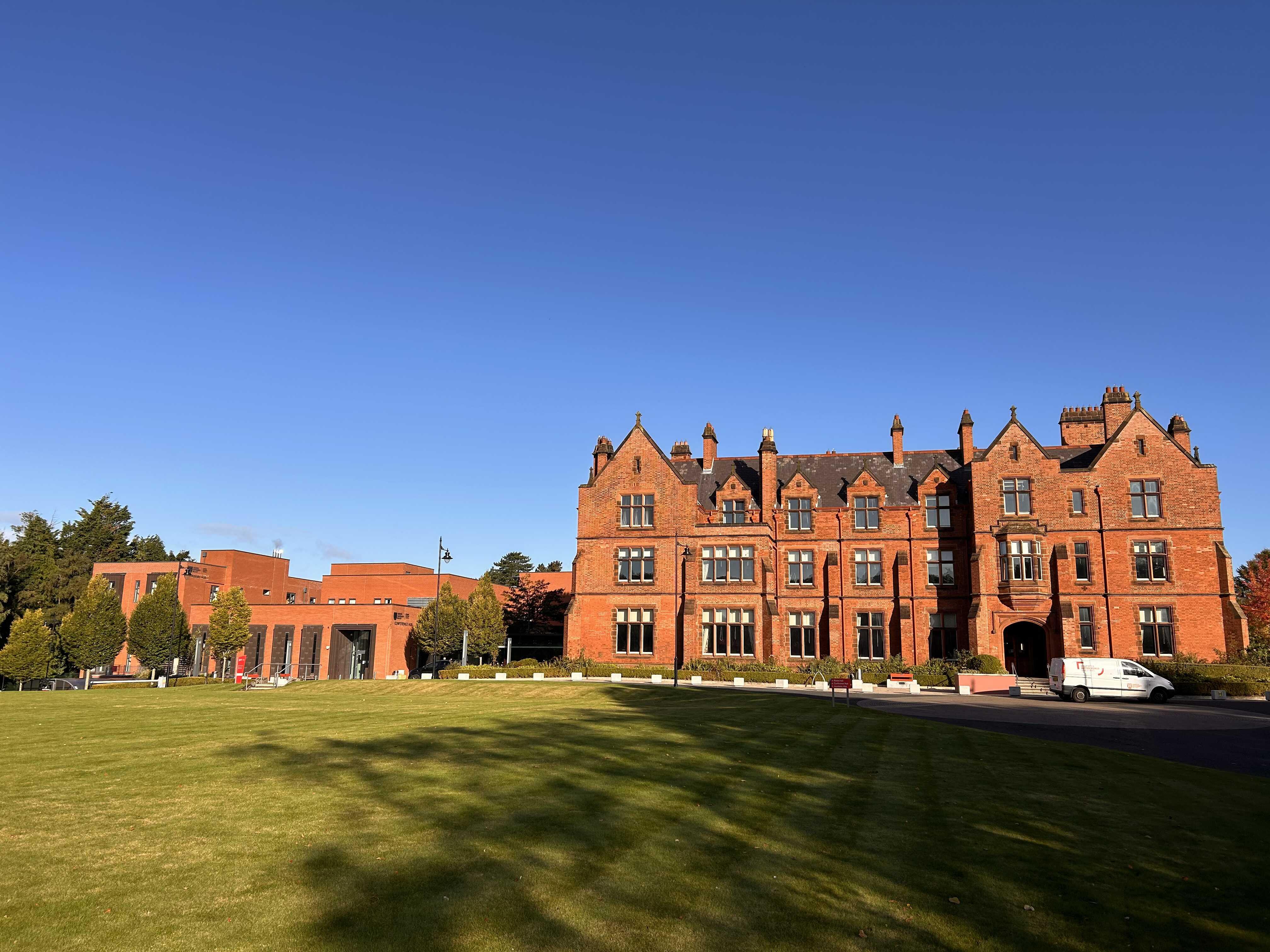





Likes
- Awesome architecture and building
- Very smooth processing of requests
- Provide an excellent platform for studies ( Silent study area in graduate School, McCLay Library)
Dislikes
- High Shopping Costs: Daily essentials and groceries are notably more expensive in university areas around Queen’s University, which strains student budgets.
- Expensive Studio Apartments: Accommodation rent, especially for studio apartments in Queen’s housing, is high, making it challenging for students seeking affordable housing close to campus.
- Limited Budget Flexibility: Students often depend on scholarships or part-time work, and the higher expenses in the area can create financial pressure.
Scholarship
- I received PhD studentship under EPSRC they cover the tuition fees and living stipend.
- Annual tuition: £25,600 and Stipend of £1608 for a month.
- Eligibility criteria:- The proposed project must fall within the EPSRC remit
- Demonstrate a clear commitment to remaining in academia
- PhD thesis submission must be within six months prior to starting the fellowship
- Hold qualifications or experience equal to an honours degree at a first or upper second class level, or a masters from a UK academic research organisation
- Hold fellowships aimed at later career stages from EPSRC, Royal Society, or Royal Academy of Engineering
- Residency status determines eligibility for full fees and stipend

 - Nikhil Bajpayee.jpeg)

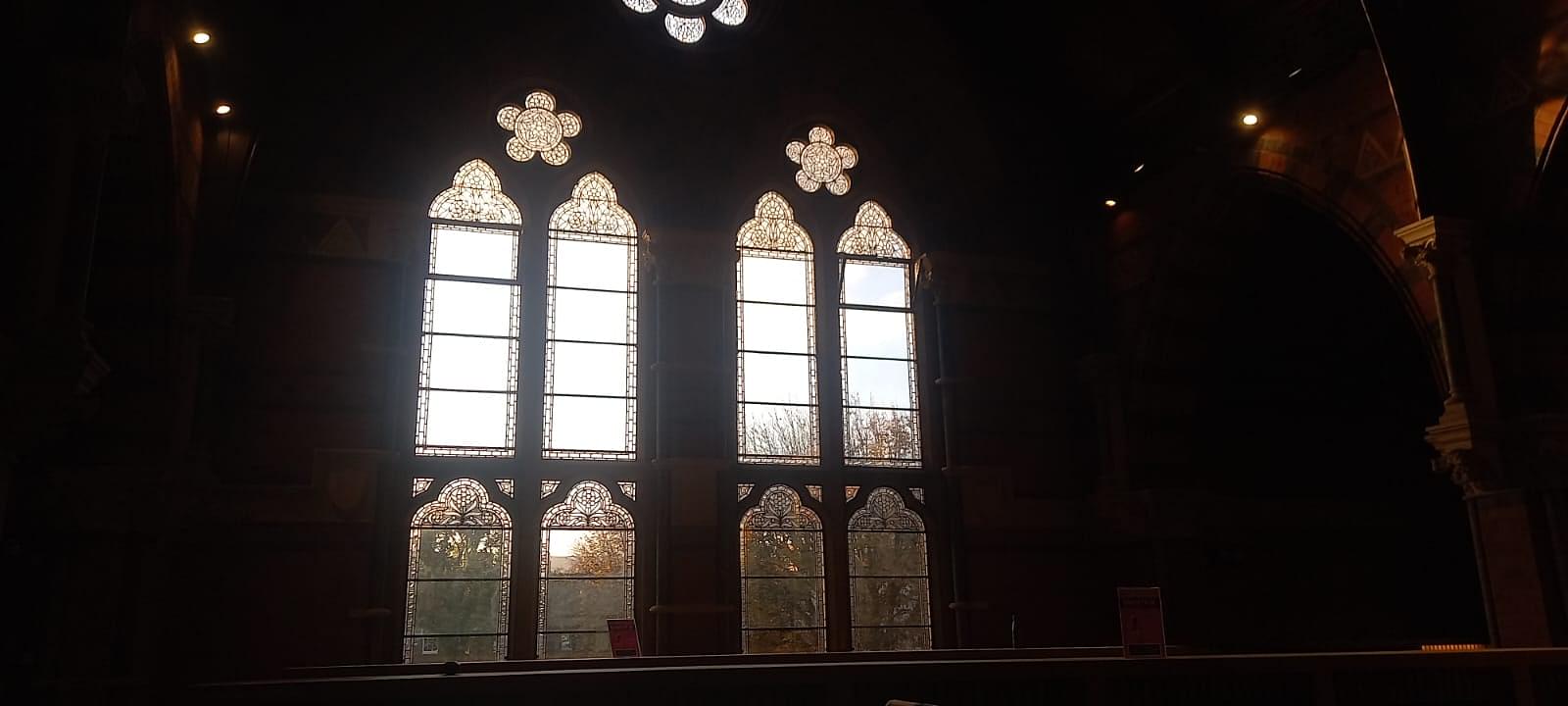
 - Nikhil Bajpayee.jpeg)
Likes
- High Research Output: My course involved a lot of research work whether it is dry lab or wet lab, and Queen’s University Belfast had a high research output. Even the assignments and exams were devised in a way which required a lot of research and creative thinking which enriched my academic experience and allowed me to think out of the box and find the reason behind every line in the research papers. There was nothing as rote-learning, I had to logically think before writing every answer.
- State-of-the-Art Facilities: As mentioned, Molecular Biology and Biotechnology was all about lab work and the university provided access to modern labs and research equipment. There were no restrictions on the amount or type of reagents that we could use. The lab managers made sure that we had access to all the right chemicals, required for our practical. The University encouraged hands-on research. We had access to all the research papers published till date with the university email ID and could even print them free of cost at the library.
- Supportive Professors: The professors and lab managers were incredibly knowledgeable and supportive. They never doubted us if we made mistakes, rather would encourage us to repeat the experiments and find out the mistake on our own. They supported me when I would not obtain the desired experimental results. I went to them with the silliest of questions and they would patiently explain them till my doubts were cleared. They were instrumental in shaping my research mind and building my analytical and logical skills.
Dislikes
- High Tuition fees: The tuition fees are high for international students, which put financial burden on me and my family.
- High Accommodation and Living Costs: Student accommodations were relatively expensive as well, due to which I had to do part-time jobs to support my living costs. Even the public transport was expensive which forced me to walk most of the times even in bitter cold.
- Limited food options: The variety of food options available on campus were limited and costly.
Scholarship
- I received an International Office Postgraduate Scholarship of £3000 (as of 2022). All international students who are selected and have a 2:1 grade are eligible for this scholarship.
- It was £3000.
- I am not sure about the number of students receiving scholarships but I assume all the students who score a 2:1 grade receive the amount.
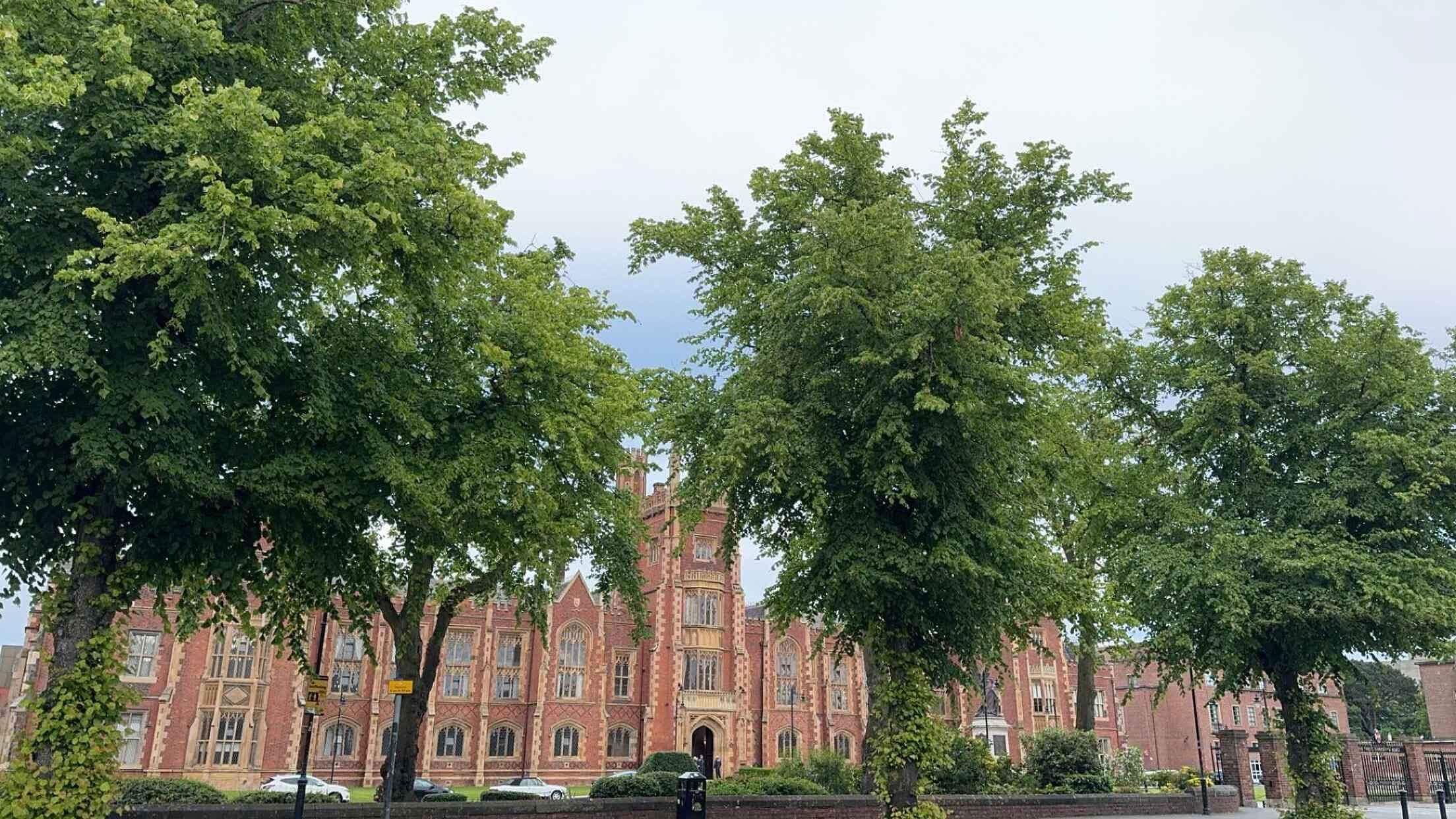
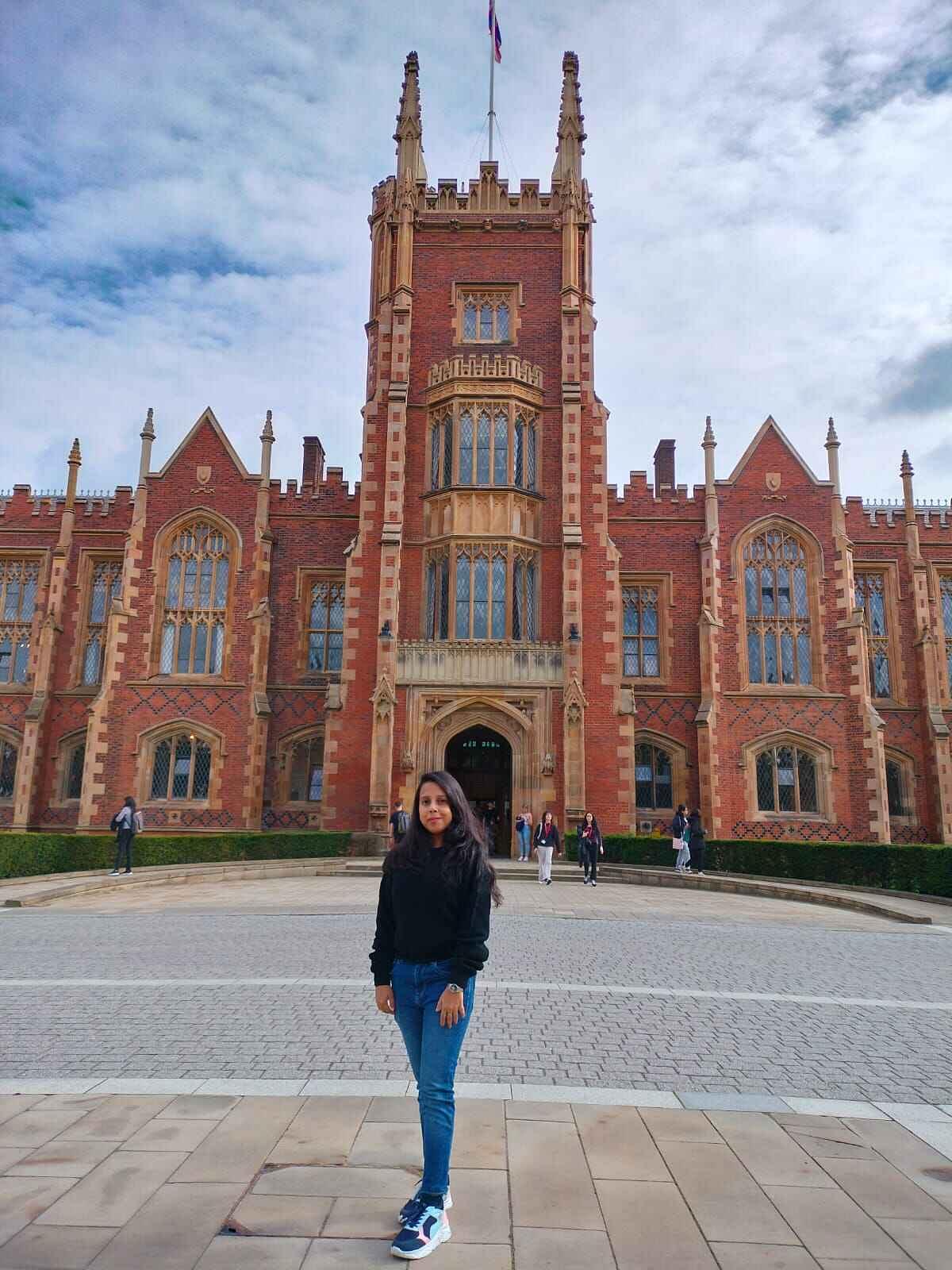
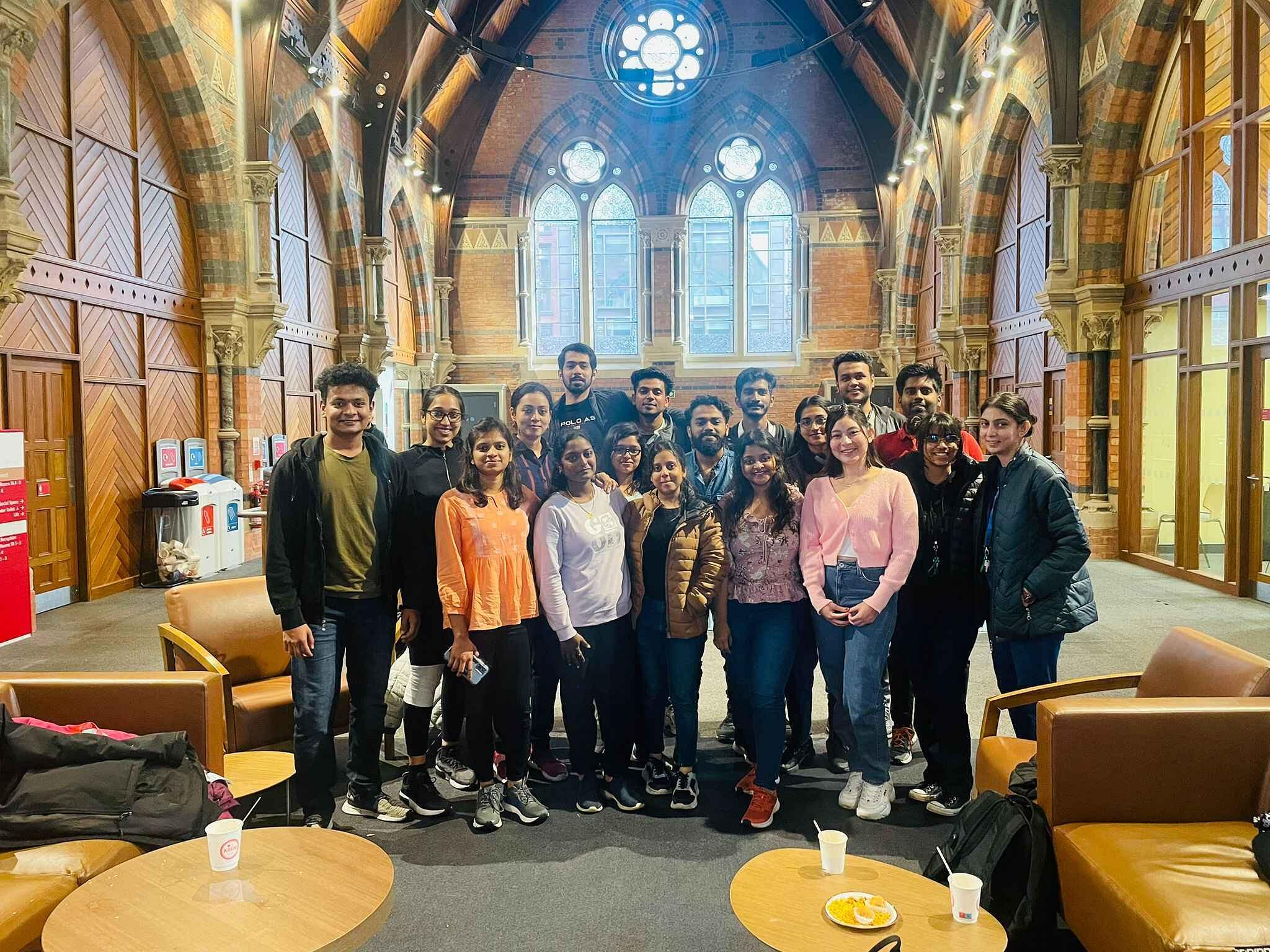
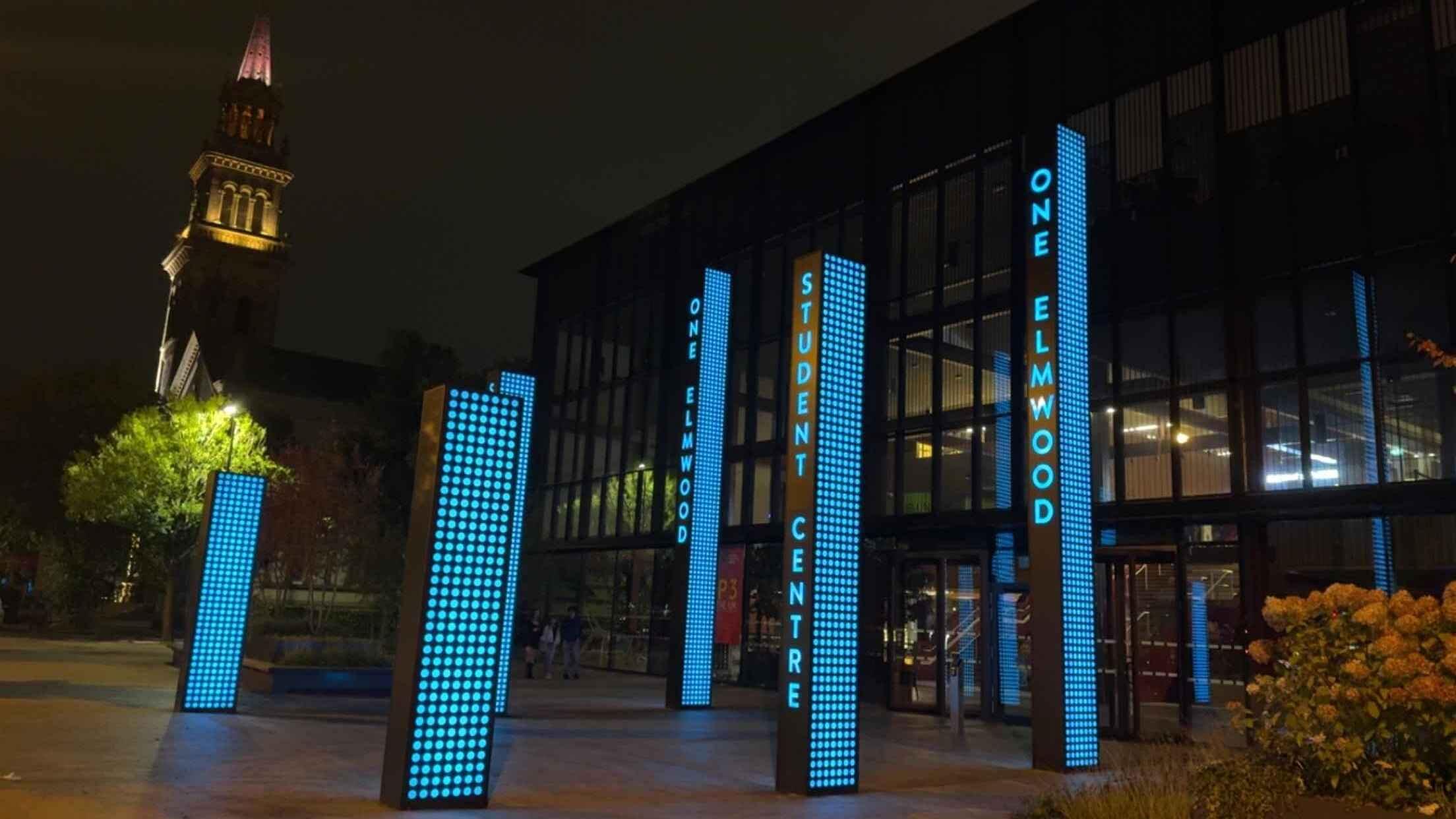




Likes
- A really interesting point about QUB was their engagement with students. my department, HAPP, often organised events to make sure the students are connected and remain cordial.
- Friendly and supportive professors that made the 3 years of the degree really enjoyable and less stressful
- Teaching assistants: our TA's would usually take non-lecture classes which were less formal and more interactive. this helped us students to clarify our doubts at a more relaxed pace.
Dislikes
- The university campus is spread on a vast broken up scale. there are many buildings that are in different locations so going from one location to another with 5 minutes in hand between classes was a big challenge at times.
- The unpredictable nature of the weather would really bring down the morale of many international students and also the will to go to classes in a sudden downpour. thw winters are also unbearable at times.
- My course, in my opinion, needs to be heavily decolonised. Majority of its content is western influenced and lacks diversity. Even in talking about political instabilities in countries, very less focus is on the eastern world.
Scholarship
- I got the international office scholarship for about 1000 GBP just for my first year. All international students for their first year mostly get this scholarship.
- One of my batchmate got India academic excellence scholarship too.
- There is no specific data for the number of students who get such scholarships open to students but I think the administration can provide such information on request.

 - Prakkriti Modi.jpeg)
 - Prakkriti Modi.jpeg)
 - Prakkriti Modi.jpeg)
 - Prakkriti Modi.jpeg)
 - Prakkriti Modi.jpeg)
Likes
- • High Research Output: My course involved a lot of research work whether it is dry lab or wet lab, and Queen’s University Belfast had a high research output. Even the assignments and exams were devised in a way which required a lot of research and creative thinking which enriched my academic experience and allowed me to think out of the box and find the reason behind every line in the research papers. There was nothing as rote-learning, I had to logically think before writing every answer.
- • State-of-the-Art Facilities: As mentioned, Molecular Biology and Biotechnology was all about lab work and the university provided access to modern labs and research equipment. There were no restrictions on the amount or type of reagents that we could use. The lab managers made sure that we had access to all the right chemicals, required for our practical. The University encouraged hands-on research. We had access to all the research papers published till date with the university email ID and could even print them free of cost at the library.
- • Supportive Professors: The professors and lab managers were incredibly knowledgeable and supportive. They never doubted us if we made mistakes, rather would encourage us to repeat the experiments and find out the mistake on our own. They supported me when I would not obtain the desired experimental results. I went to them with the silliest of questions and they would patiently explain them till my doubts were cleared. They were instrumental in shaping my research mind and building my analytical and logical skills.
Dislikes
- • High Tuition fees: The tuition fees are high for international students, which put financial burden on me and my family.
- • High Accommodation and Living Costs: Student accommodations were relatively expensive as well, due to which I had to do part-time jobs to support my living costs. Even the public transport was expensive which forced me to walk most of the times even in bitter cold.
- • Limited food options: The variety of food options available on campus were limited and costly.
Overview
- I applied to 6 Universities: Queen's University Belfast, University of Glasgow, University of Edinburgh, Newcastle University, University of Leeds and University of Aberdeen. I was Admitted to all the 6 Universities. I received offer letters (admission confirmation) from all the 6 Universities and then I chose Queen's University Belfast. No, my application was successful in each of the 6 colleges that I applied to.
- I chose Queen's University Belfast solely because of it's reaserach excellence. Although all the other colleges also had a significant research output and were a part of Russell's group, I wanted to specifically work on Cancer Biology and Therapeutics. Luckily, I was selected for the same and carried out reasearch related to cancer during my thesis. I wanted to understand the molecular mechanisms of tumor microenvironment and it's therapeutics and Queen's throughly focused on immune responses and gene regulation which matched my research interests.
- The admission process is as follows:
Entry Requirements:
1. A 2:1 degree is required in a relevant field. For my course, this would be a background in Biology, Biochemistry, Biotechnology, Microbiology or any other relevant field (I did Biotechnology engineering).
2. English language proficiency is also required for international students (IELTS/TOEFL). Specific details about scores can be found on the website. - Application Process:
Online Application: Applications are submitted directly through the QUB online application portal. The process is fairly straightforward and can be done on your own.
Necessary documents: 1. Academic transcripts
2. Degree certificate or Provisional Degree certificate (if degree certificate is not available yet).
3. CV
4. References (usually two academic or professional references)
5. Personal statement or Letter of Motivation (I feel this is the most important document for selection).
6. English language proficiency proof - Visa Requirements: International students who are accepted to Queen’s will need a Tier 4 or Student Visa to study in the UK.
-
If the application is successful, then the University will provide a Conditional offer letter, stating some requirements that you have to meet if you are still completing your Bachelor's or an Unconditional offer letter you meet all the requirements.
-
The eligibility criteria depends on the course. For Molecular Biology and Biotechnology, it was 2:1 grade in any Biology related discipline along with an IELTS score greater than 6.0. I recommend going through the details of the specific course in order to find out the correct eligibility criteria, as it differes from course to course.
-
The overall admission process was faily smooth. There were college representatives who would guide us with the admission process. Also, the admission team is quite helpful, they will respond to any queries within a day making the application process fast and smooth. The only challenge I faced was regarding the uncondional offer letter: Due to a huge number of applicants in September, there was a slight delay in providing me the uncondional offer letter due to which I faced minor problems with the visa application. Other than that, everything is good! I wish you all the best and good luck with your application!
-
I applied for September 2022/ fall 2022 intake. I started applying from December 2021 and received a Condional offer letter in January 2022 as I was still completing my bachelor's. The conditions stated that I have to complete my Bachelor's without failing in any subject and have to obtain the expected grade which I stated in my application form. Received an Uncondional offer letter in August 2022 when I submitted my 8th Semester marsheet and provisional degree certificate.
Scholarship
- Yes, I received an International Office Postgraduate Scholarship of £3000 (as of 2022). All International students who are selected and have a 2:1 grade are eligible for this scholarship.
- I am not sure about the number of students receiving scholarships but I assume all the students who score 2:1 grade receive the amount.
Overview
Belfast's cost of living is quiet low compared to the main lands. Qub is ranked 43 and is a Russell league University.
Overview
For better understanding and results and a better learning experience. Also for exposure and success.
Scholarship
Yes, I just applied and recieved
Overview
Queens University is located in Belfast,Northern Ireland.It is a good university with world class research facilities.Furthermore the scholarship was a positive incentive.The living cost is belfast is lower than major Uk cities which allowed me to save on some money.As an International student,I wanted to save enough.Business and Management course came with a placement year which was a great thing.It will allow me to gain hands on practical experience while studying.
Scholarship
No,I haven't received any merit related scholarship.I have received the general university scholarship which is available to all international students.




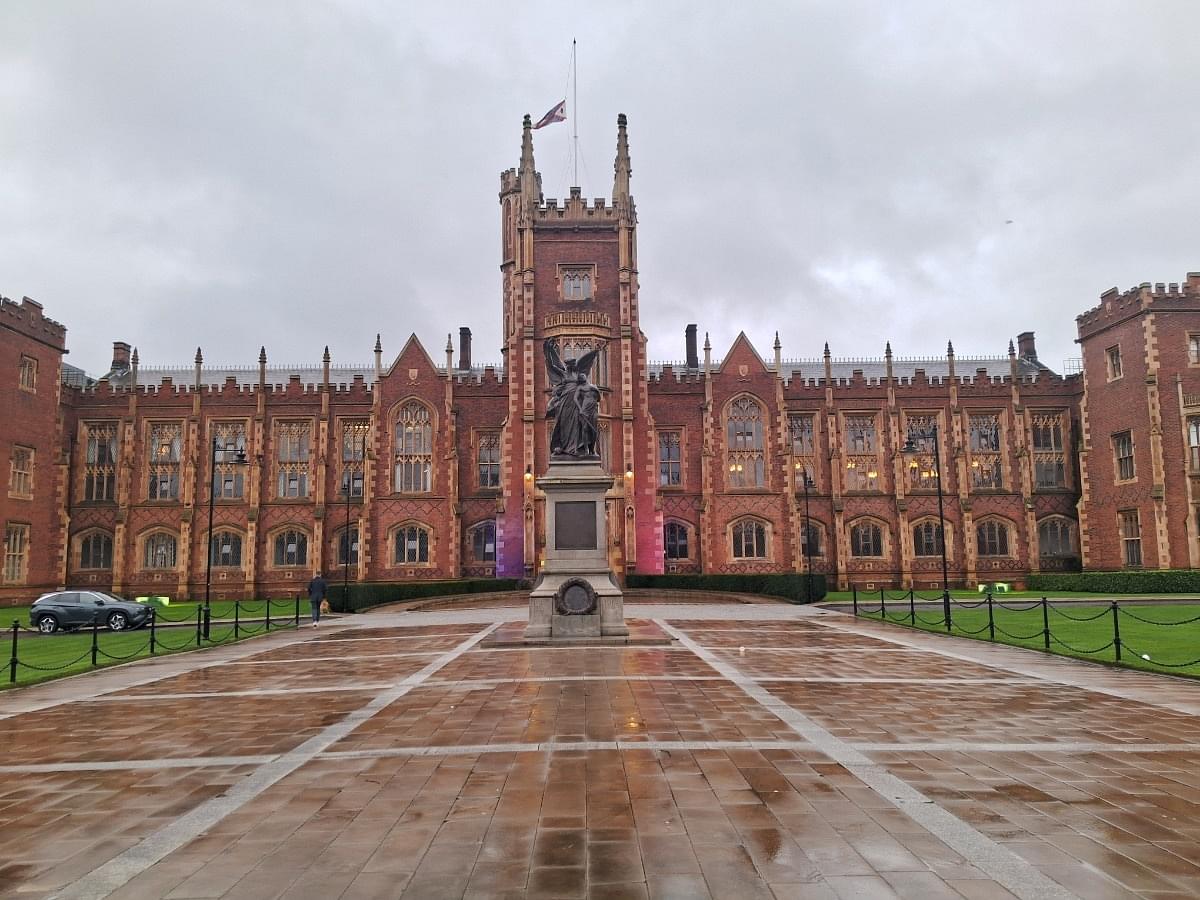
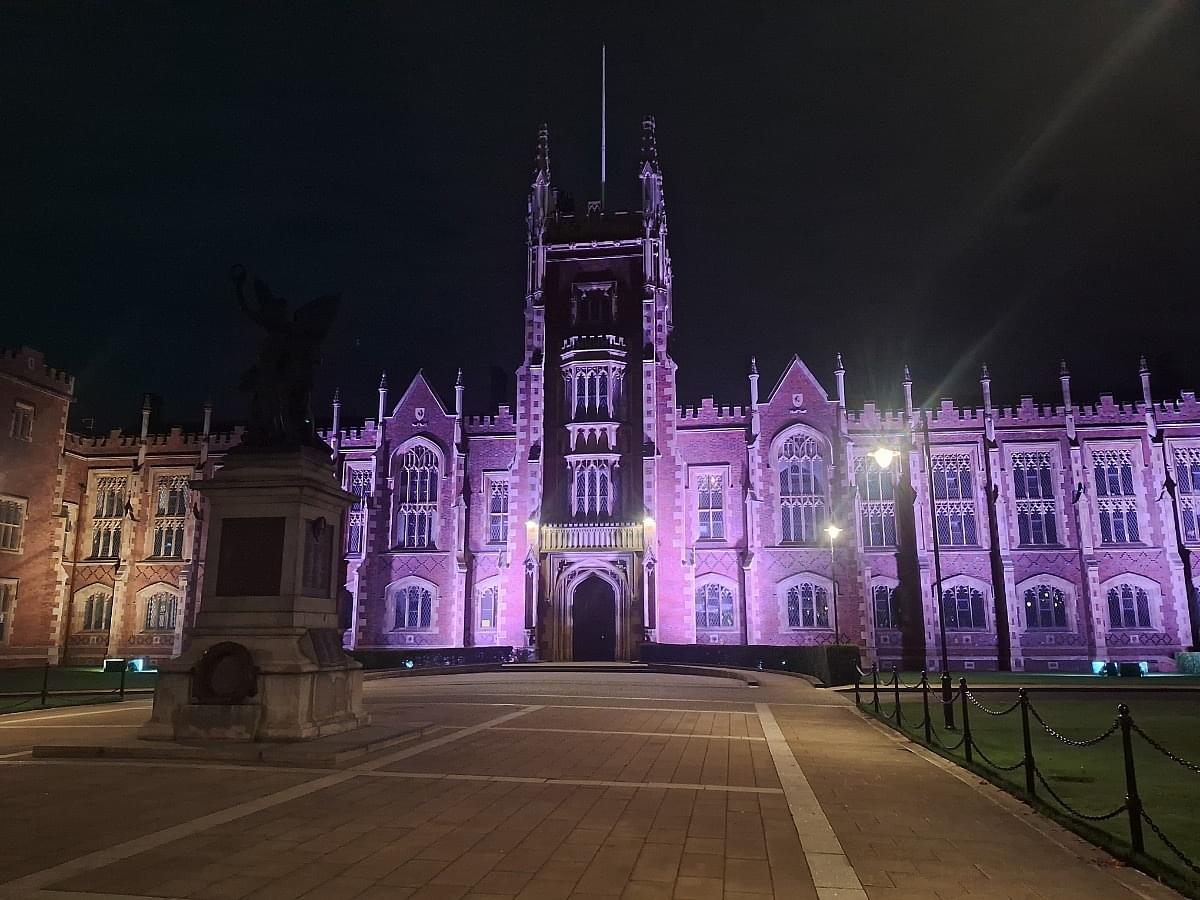
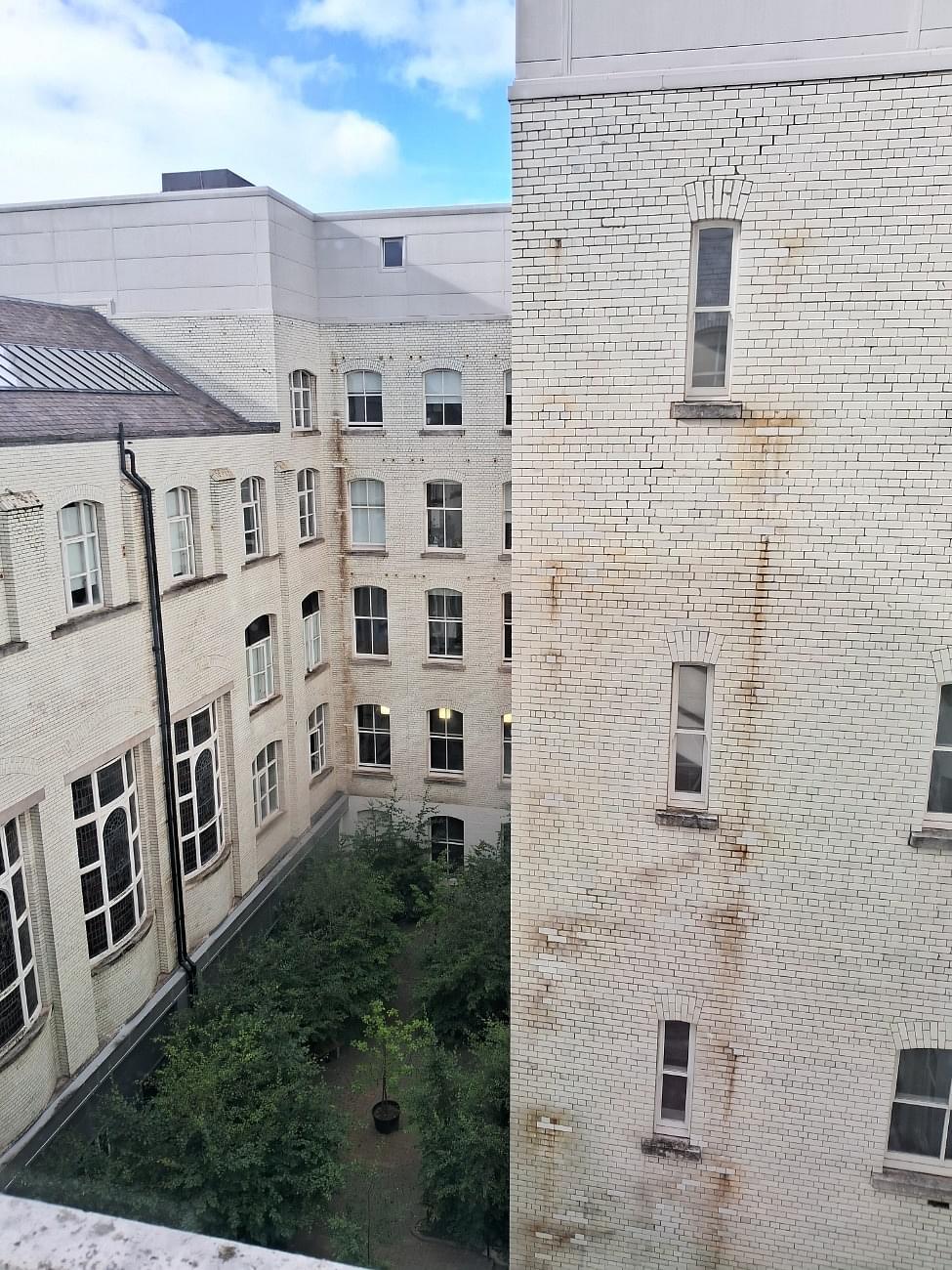
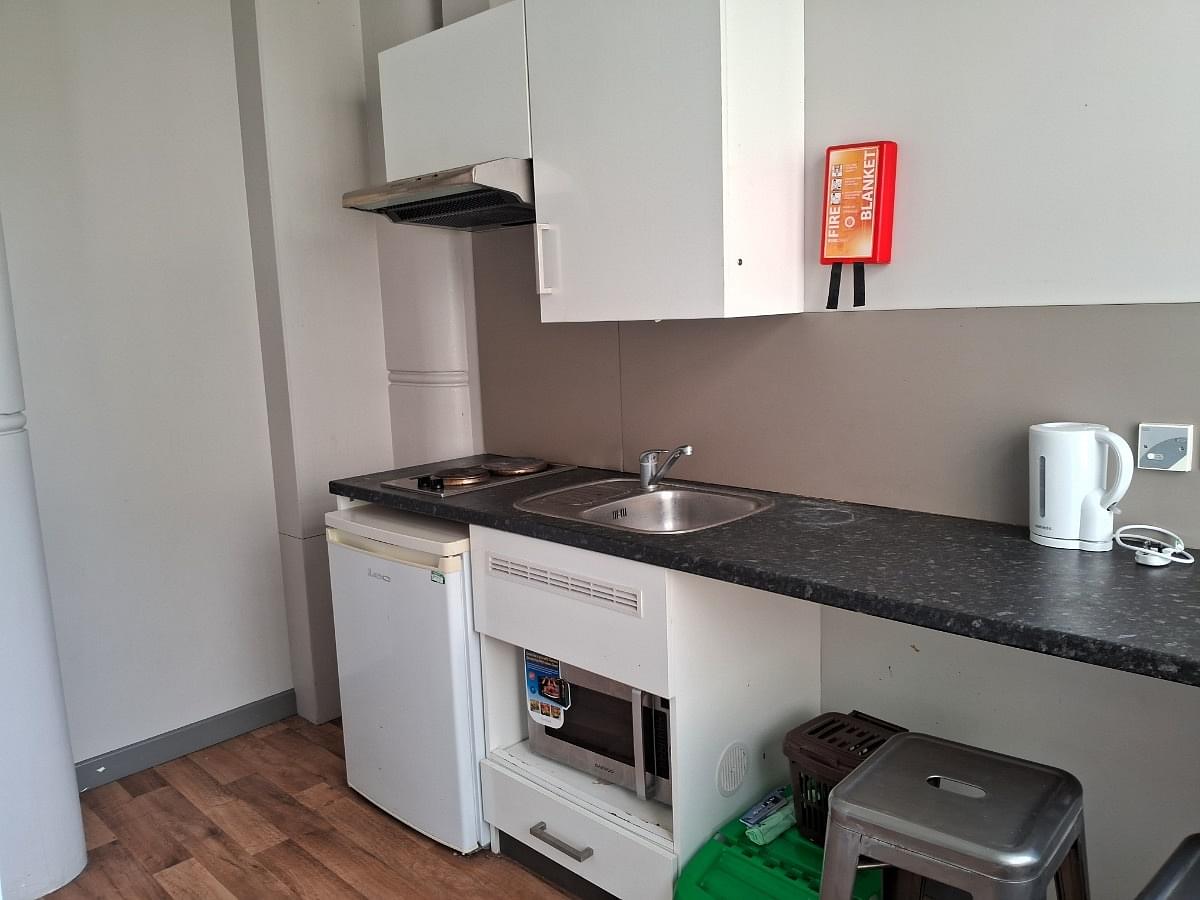
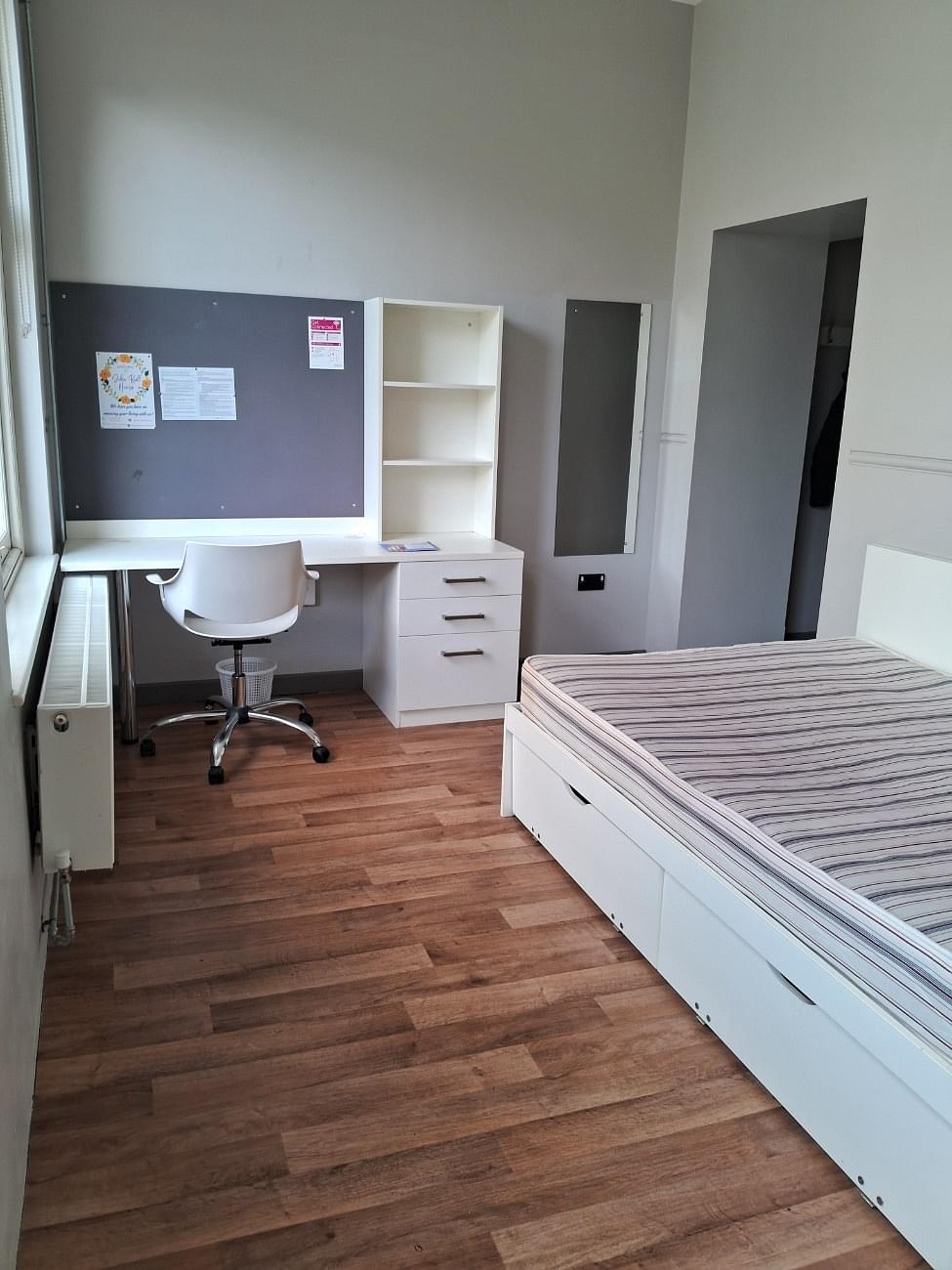
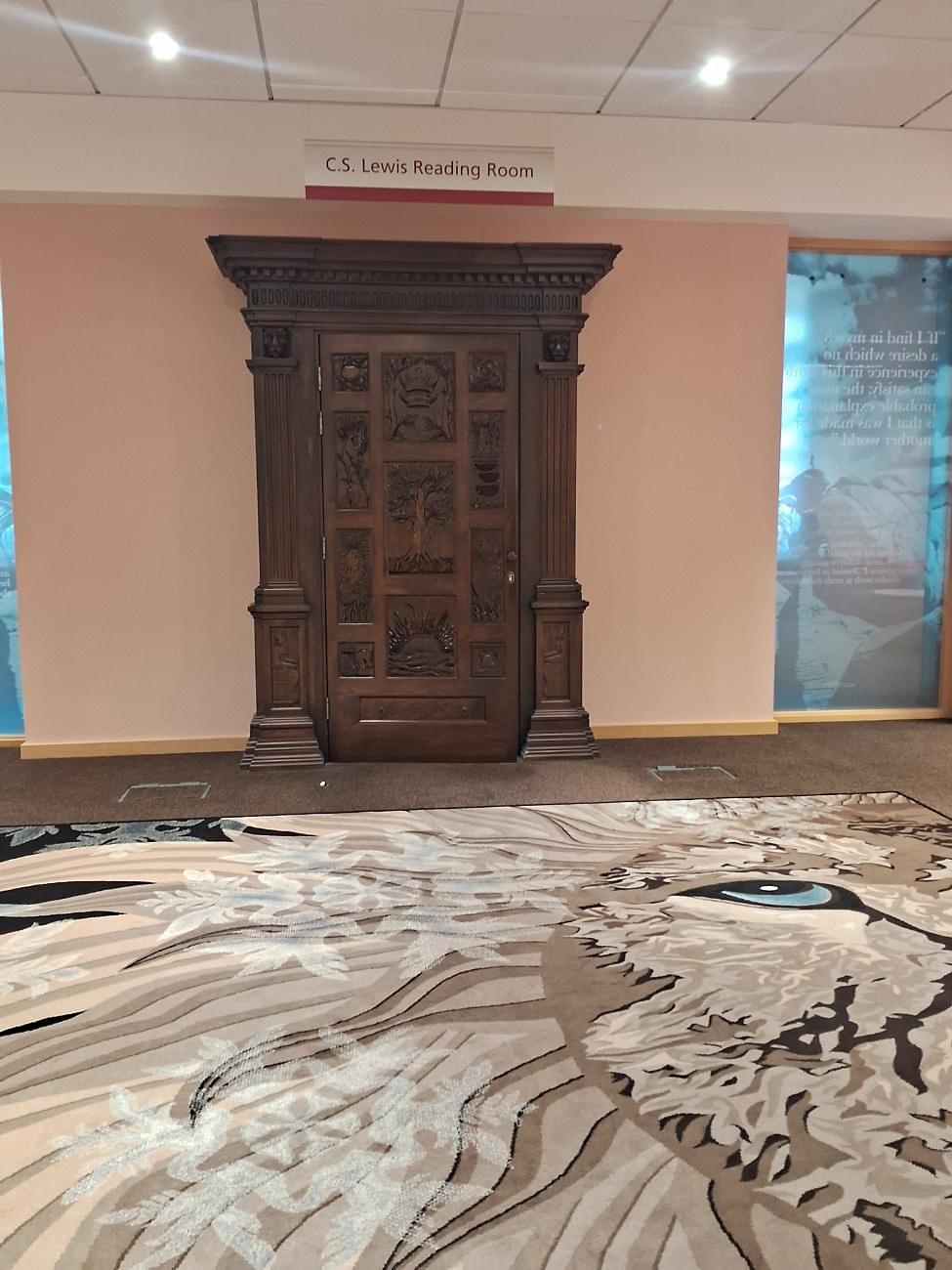










Comments